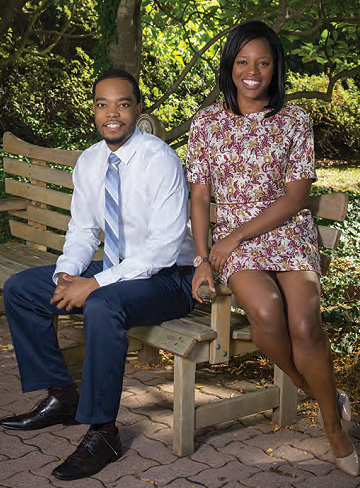
Dexter Graves and Bisola Egbe founded the Drexel Black Doctors Network program.
The Drexel Black Doctors Network program was initially proposed last winter, and it was officially recognized by the College of Medicine in August, at the start of the new school year. We are currently in the process of recruiting physicians willing to aid in this effort. Dr. Theodore Corbin, our faculty adviser and sponsor, has handled the initial recruitment. We are also currently reaching out to a number of doctors with whom we have come into contact, and we are actively publicizing the program to students. Our aim is to have the program up and running by January 2016.
In our class, there are 17 black students — about 6 percent. It is interesting to note that 100 percent of those students entered through a nontraditional acceptance pathway; most participated in the Drexel Pathway to Medical School program. According to the Association of American Medical Colleges, only 4 percent of practicing physicians are African American, despite the fact that African Americans make up 12 percent of the U.S. population. It can sometimes be discouraging when you feel as though there is an underrepresentation of medical professionals who share similar cultural and ethnic backgrounds with you. By partnering with a mentor who is similar in both ethnicity and cultural background, you can learn many beneficial skills to better equip you to be successful on the medical path. Shadowing an African-American physician also helps us learn to treat a more diverse group of patients. It is our hope that this program will provide the motivation and the confidence needed to not only succeed, but to excel.
We have both had our own unique journeys getting to this point in our medical career path. We each took some time off after undergraduate school to increase our chances of getting into medical school — both of us working in research, one of us earning a master’s degree. It has definitely been a struggle. While neither of us would completely place blame on race, we do recognize that there are often more obstacles to overcome to get to this position as an underrepresented minority.
Many black students have chosen to attend medical school at the historically black medical colleges where there are enough African-American doctors to serve as mentors. In a way, we are trying to give African-American students at Drexel an advantage that they would have if they attended a historically black medical school. Our overall vision for the Drexel Black Doctors Network is to build relationships between African-American students and physicians that will last far beyond their four years at the College of Medicine.
— Bisola Egbe and Dexter Graves